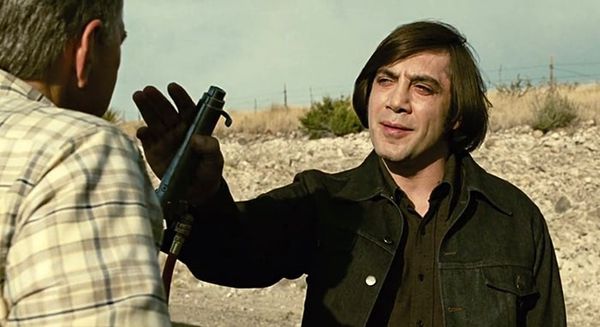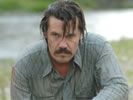Eye For Film >> Movies >> No Country For Old Men (2007) Film Review
No Country For Old Men
Reviewed by: Anton Bitel

"I was sheriff of this county when I was 25 years old. My grandfather was a lawman. Father too…"
The voice-over that opens No Country For Old Men is a nostalgic plea for tradition, as well as an elegiac recognition of its passing into oblivion. As he puts it himself, Sheriff Ed Tom Bell (Tommy Lee Jones) "always liked to hear about the old-timers", and now that he is approaching retirement, he is something of an old-timer himself – a last link to the history of Texas' Old West, and of the men who patrolled the frontiers of decency and lawlessness. These days, though, he feels less and less able to comprehend the new breed of violent criminal that has drifted into town.

Take Anton Chigurh (Javier Bardem), for example. We first see him using a pair of handcuffs to garrote the policeman who has just arrested him – and then murdering an uninvolved driver on the road for good measure, just so that he can take his car without leaving a witness. Coin-flipping Chigurh lacks all compunction or remorse, and plays rigidly by rules meaningful only to himself – and he will stop at nothing to track down a satchel full of hard cash that has gone missing after a drug deal that went badly wrong. Vietnam veteran Llewelyn Moss (James Brolin) has chanced upon the money while out hunting alone in the desert, and must now confront the full consequences of his failure to resist temptation, even at the risk of his own life, or indeed that of his beloved wife Carla Jean (Trainspotting's Kelly Macdonald, with nary a trace of her native Scots brogue).
No Country For Old Men is essentially a chase caper. Chigurh and a bunch of Mexicans are chasing Moss, professional fixer Carson Wells (Woody Harrelson) is chasing an increasingly out-of-control Chigurh, and everyone is chasing the money - with Sheriff Bell several steps behind trying to find some sort of sense in the moral chaos unraveling before him. Yet, this being a Coen brothers production, there is so much more to it than just the usual, narrow considerations of genre. Playing out against vast southern backdrops (beautifully framed by the Coens' regular DP Roger Deakins), the film allows its cat-and-mouse convolutions to take on the proportions of a biblical epic, as good and evil (and everything in between) are shown negotiating an ever-shifting borderland that is etched as much into the psyches as into the environment of its characters.
Adapted by the Coens from the 2003 novel of Pulitzer Prize-winning author Cormac McCarthy, No Country For Old Men is a morality tale played as darkly comic modern oater. It is full of the brothers' trademark wit and surreal flourishes, but also unremittingly tense and bleak, as a whole world of trouble closes in on the hapless Moss who, against all better advice, deludes himself to the end that he and his loved ones can take on what is coming to them. All three leads are a revelation, with Bardem in particular offering the most terrifyingly implacable on-screen incarnation of evil since Dennis Hopper inhaled gas through a mask as Frank Booth in David Lynch's Blue Velvet (1986).
Even though this would probably qualify as the Coens' most violent film to date, it is still remarkably restrained, never showing us more than we need to see, and leaving the huge shoot-out that first triggers its events, and several subsequent acts of slaughter, entirely off-screen but for their bloody aftermaths. Indeed, while the whole film seems to be propelling itself towards a couple of monumental showdowns between its principal characters, one of these is presented only in bold ellipsis, while the other never actually takes place (as though to suggest that the forces of light and shadow can never collide head-on).
Like the Coens' earlier Fargo (1996), No Country For Old Men features a psychotic killer as the wild card in an otherwise conventional crime scenario; and dead dogs here form a bewilderingly recurrent motif similar to the lost hats in Miller's Crossing (1990); but it is the Coens' broad kidnap comedy Raising Arizona (1987) that is unexpectedly evoked in the final scene, not because No Country For Old Men is, or in any way pretends to be, as riotously funny, but rather because both films close with the most imponderably terrible of circumstances being met with dreams of a better world to come. Here, good and evil will always co-exist, like two sides of a coin. It is an ending ambivalent enough to haunt you well after the final credits – perfect for a film whose long, twisted narrative roads, rather than converging on some obvious, hackneyed point of closure, instead open out to infinite horizons. It is what elevates No Country For Old Men beyond its undoubted genre thrills to the more rarefied heights of a true classic.
Reviewed on: 12 Dec 2007



















